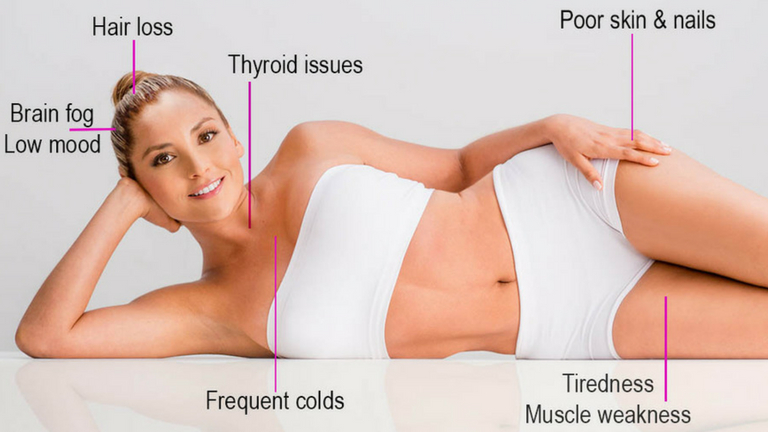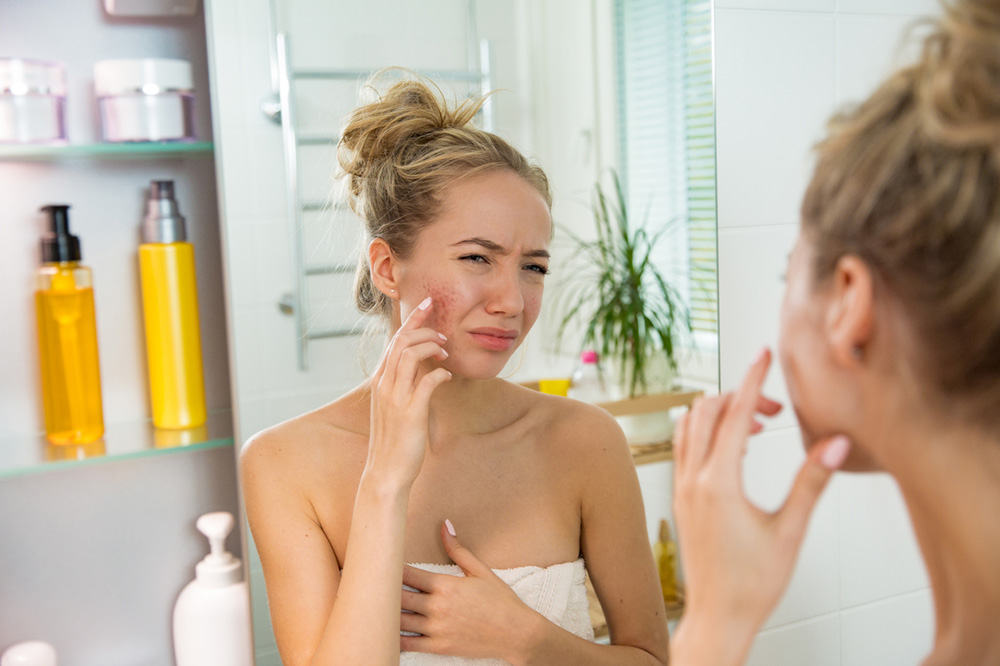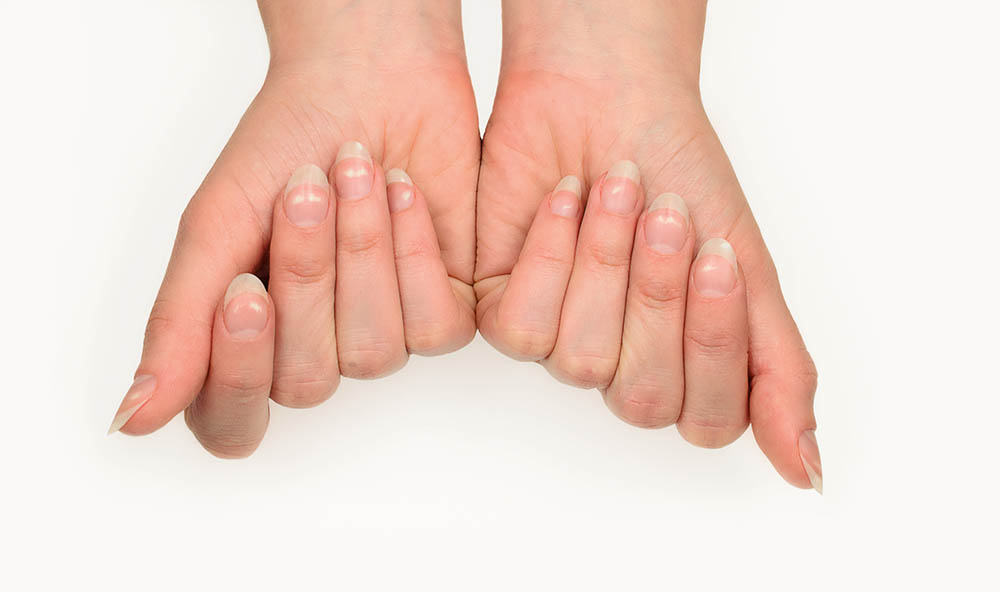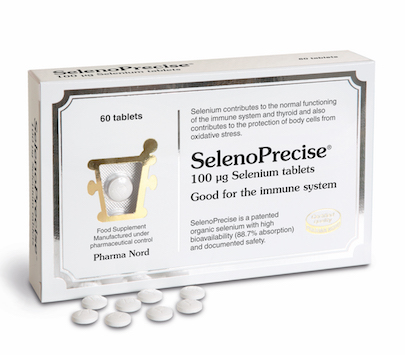Weak skin and nails, brain fog and tiredness aren’t just signs of old age, they could be your body trying to tell you it needs selenium
We’re always hearing about the vitamin D deficiency crisis in the UK or about how taking omega-3s is essential for heart and brain health.
But one nutrient we rarely hear about is selenium. And yet, this trace mineral derived from nuts and whole grain cereals is a powerful antioxidant essential for health. Trouble is, we’re probably not getting enough.
‘Selenium insufficiency may be one of the most under-reported nutritional issues in the world,’ says leading nutritional scientist, Frankie Brogan. ‘It deserves similar recognition to that given to vitamin D or omega 3.’
Who’s at risk?
While selenium is present in protein foods, including seafood, lean meats and poultry, eggs, legumes (beans and peas), nuts, seeds, and soy products, low levels in our soils mean even if we eat such foods we might not be getting enough.
The world’s selenium is unevenly distributed and some locations, such as America and Japan have high levels in their soils. Others, like the UK and Ireland have low levels.
In fact, according to a 2015 systematic review of studies on selenium intake between 1990 and 2014 published in the journal Nutrients, low levels of selenium are widespread throughout Europe, the UK and the Middle East.
‘This low level in soil directly impacts the selenium quantity of the food grown in local argriculture,’ says Brogan.
According to a 2017 study by Swiss scientists selenium in soil is expected drop a further 8.7 per cent by 2099.
In fact, rather than help the process, because of the use of fertiliser from UK animals grazing in low-selenium UK fields, the rise in organic farming in the last two decades has been associated with lower selenium levels in our soils, Brogan asserts.
Why vegans need to watch their selenium levels
Indeed, most recent UK statistics from the National Diet and Nutrition Survey suggest females are more likely than males to not get the levels of selenium we need.
What’s more, according to Brogan, some of our modern diets could also be hindering, rather than helping our selenium levels.
‘Some studies indicate certain groups such as vegans, vegetarians and those who avoid gluten could be at higher risk of selenium insufficiencies,’ says Brogan.
those who avoid gluten because of coeliac disease may also have issues with absorbing selenium
In one study from Sweden published in the American Journal of Clinical Nutrition the diets of vegans were compared to omnivores and female vegans were the lowest in selenium.
In another paper published in the journal Nutrition women consuming a diet that was both low fat and vegan were lower in various nutrients, including selenium.
Lastly, Italian research published in 2010 found those who avoid gluten because of coeliac disease may also have issues with absorbing selenium, a problem which the study authors linked to an increased incidence of thyroid disease in this group (see below).
Here are the signs you may not be getting enough selenium:
Thyroid issues
Selenium is needed for the body’s metabolism regulation, especially the proper functioning of the thyroid.
‘Selenium insufficiency can lead to increased risk of thyroid damage,’ says Brogan. ‘The thyroid produces hydrogen peroxide which can damage cells. Selenium antioxidants can help neutralise this damage.’
Brain fog
Adequate selenium levels are needed to make what are called selenoproteins, involved in a wide range of health functions, which is why not getting enough impacts so many processes in the body – most importantly brain function.
These selenoproteins have a direct involvement in the brain’s signalling pathways, especially those neuronal cells, which use a neurotransmitter called GABA as their main signalling molecule.
‘One of the reasons adequate selenium is so important is that the body will usually take what selenium is available and use it to help regulate thyroid function,’ says Brogan.
‘As a result, there is usually less selenium available to make more selenoproteins to help support cognitive function and other body processes, which is why those with a deficiency often report cognitive disruption, memory and attention issues or ‘brain fog.’
Low mood
If you suffer with low mood or mild anxiety, low selenium levels may be to blame.
Selenium helps the body create energy and to reduce oxidative stress
One review of studies published in the journal Nutrition Neuroscientist found that those with low selenium levels also complained of low mood and after supplementation, reported improved mood and reduced anxiety.
Tiredness and muscle weakness
Selenium helps the body create energy and to reduce oxidative stress, which means that more oxygenated blood can get around the body, says Rick Hay, nutritionist and lecturer in weight management at The London School of Naturopathic Medicine.
‘Without such adequate oxygenation of blood you could get tiredness, fatigue and even muscle weakness’, says Hay.
Hair loss
Selenium activates an enzyme important for the regeneration of important antioxidants in the body, such as vitamin C.
These promote hair growth and hair regrowth by killing harmful free radicals while regulating cell growth and health. Hair loss that comes on relatively quickly and is evenly distributed may be a sign of selenium deficiency.
Poor skin and nails
‘Selenium is needed to form selenoproteins, which are necessary for the creation of glutathione peroxidase,’ says Hay. Glutathione peroxidase is your body and brain’s master antioxidant and detoxifier.
‘It helps protect against free radicals so helps also with skin appearance and to reduce wrinkles,’ says Hay.
Skin discolouration such as pallor or heavy whitening of the fingernail beds are also signs of chronically low selenium intake.
Frequent colds and infections
‘Selenium’s strong antioxidant activity makes it important for good immune health,’ says Hay. ‘This is part of its glutathione peroxidase action that protects against oxidative damage’.
Selenium also has anti inflammatory properties too, Hay explains.
For these reasons, frequent colds, infection and a generally low-functioning immune system, could signal a selenium insufficiency.
‘Selenium is essential for the production of healthy sperm in men too and and also appears to have cardio vascular benefits,’ says Hay.
Can I be tested?
‘Technically, yes but selenium tests are uncommon,’ says Brogan. ‘You could have your blood selenium tested for instance, though this is not something routinely done by doctors.
‘But this would only indicate how much selenium was consumed recently.’
It’s important to maintain selenium balance which is why quality supplements are ideal
Much of our selenium is deposited into cells and tissue around the body (as as the thyroid gland, see above), so blood tests may not pick up on this, Brogan asserts.
‘Hair strand mineral tests have become popular but these are typically highly inaccurate and do not reflect true nutritional values at all.’
How much do I need?
‘Low selenium levels are dangerous,’ says Brogan. ‘But so are high levels. Specifically, while the European Union recommended amounts are 55mcg a day, we typically recommend 200mcg (300mcg on rare cases) of organic selenium supplements daily.
‘These levels have been shown to offer therapeutic benefits while being well tolerated, backed by extensive safety documentation’.
But dosages of 1500-1600mcg or above start to become associated with harm and doses nearing 3000-5000mcg can cause direct DNA damage, Brogan warns.
‘It’s important to maintain selenium balance which is why quality supplements are ideal, allowing us to consume adequate selenium every day without getting too much of a good thing,’ says Brogan.
How can we gauge a supplement’s quality?
There are two things to look out for when choosing a selenium supplement, says Brogan: form and quality standards.
‘In terms of form, selenium supplements can either be inorganic (including selenite and selenates) or organic, such as that found in natural yeast that is grown to be selenium-enriched.’
Organic selenium, he points out, has been shown to be significantly better absorbed by the human body, he asserts.
‘In terms of standards and quality assurance, supplements made to pharmaceutical standards are ideal because this means they come with little chance of contamination with other compounds, they’re stable and will accurately contain what it says on the box,’ says Brogan.
‘Usually to identify such quality, you should scan the box for language such as ‘manufactured under pharmaceutical control’, or ask the manufacturer directly if unsure.
‘The majority of studies that involve selenium enriched yeast products usually opt for 200mcg a day to ensure health benefits,’ says Brogan.
Pharma Nord’s Selenoprecise (left £7.25 from Healthista Shop) contain 100mcg per tablet and are made from organic, bioavailable selenium yeast. They’re manufactured in Denmark under pharmaceutical control and studies have shown 89 per cent of the supplement is absorbed by the body, significantly higher than inorganic selenium. Two tablets a day are recommended.
Who shouldn’t take selenium?
‘Selenium-yeast products such as Selenoprecise (above) contain minute traces of yeast – certainly not enough to cause or contribute to yeast-related problems such as candida albicans, but those with severe yeast allergies should be cautious,’ says Brogan.
‘Some experts also believe that those on Cisplatin (a type of chemotherapy drug) shouldn’t take selenium – if this is you it’s best to talk to your oncologist.’
More Healthista Content:
6 gluten-free recipes with the wow factor
Got depression? Here’s why taking omega 3s could help
9 caffeine benefits proven by science PLUS which type is healthiest
Like this article? Sign up to our newsletter to get more articles like this delivered straight to your inbox.


























































